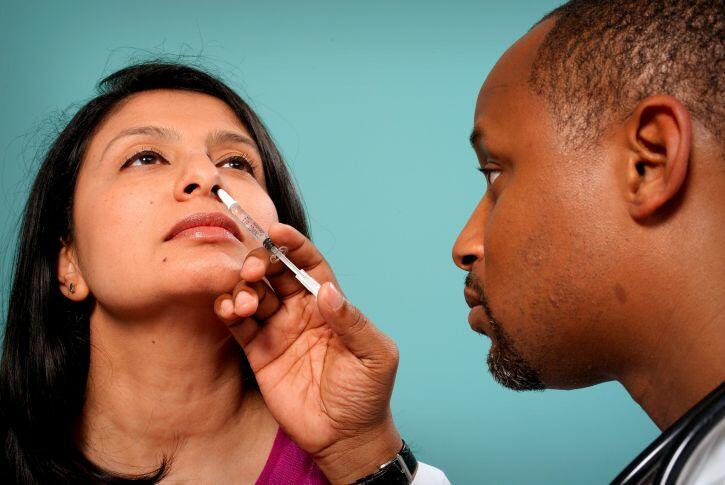
LSTM researchers, led by Dr Elena Mitsi, have investigated the impact of pneumococcal colonisation on immune responses to live attenuated influenza vaccine (LAIV) in healthy adults.
Each year, 5–15% of the world's population will suffer from a flu infection, with up to 5 million cases of severe disease and 500 000 deaths. LAIV is a nasal spray vaccine that contains live but attenuated influenza viral strains. LAIV causes a transient flu infection in the upper respiratory tract and triggers our immune system to respond to the virus. Streptococcus pneumoniae (pneumococcus) is a bacterial pathogen which is the main cause of pneumonia, a respiratory tract infection and major global health problem.
In the study, published in the journal JCI Insights, the team studied the relationship between pneumococcal colonisation, viral infection and LAIV immunogenicity using the Experimental Human Pneumococcal Challenge model developed at LSTM. The team showed that the nasal presence of pneumococcus at the time of LAIV vaccination, is associated with reduced nasal inflammation and impairs both nasal and lung immune responses to the influenza vaccination.
Dr Elena Mitsi, senior author on the paper, said: “The order of infection is an important parameter when we study bacterial and viral co-infection. Secondary pneumococcal infection after a primary flu infection is well studied, but we knew very little on the dynamics of the inverse order of co-infection. The model enabled us to control this factor, by infecting participants first with live pneumococcus and then vaccinating them with LAIV to study the relationship of these respiratory pathogens from a slightly different angle”.
Utilizing the model developed at LSTM, the team were able to test this by safely inoculating participants with live bacteria in combination with a live virus in the form of the readily available nasal vaccine for influenza.
These findings open up new avenues of bacterial and viral co-infection research. The team is currently looking at the interaction between pneumococcus and SARS-CoV-2 in asymptomatic and symptomatic COVID-19 infected patients, trying to understand whether upper respiratory tract co-infection with these pathogens can lead to more severe disease or modulate the antibody and cellular responses to SARS-CoV-2.
Pneumococcal colonization impairs mucosal immune responses to Live Attenuated Influenza Vaccine in adults
Beatriz F. Carniel, Fernando Marcon, Jamie Rylance, Esther L. German, Seher Zaidi, Jesus Reine, Edessa Negera, Elissavet Nikolaou, Sherin Pojar, Carla Solórzano, Andrea M. Collins, Victoria Connor, Debby Bogaert, Stephen B. Gordon, Helder I. Nakaya, Daniela M. Ferreira, Simon P. Jochems, Elena Mitsi
Published January 26, 2021
JCI Insight. 2021. https://doi.org/10.1172/jci.insight.141088.